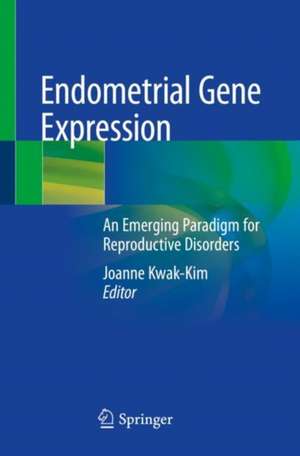Endometrial Gene Expression: An Emerging Paradigm for Reproductive Disorders
Editat de Joanne Kwak-Kimen Limba Engleză Paperback – 21 noi 2020
The endometrium goes through cyclical changes under the influence of hormones, and immune effectors in the endometrium change their populations cyclically as well. Dynamic changes in immune effectors determine endometrial cytokine and chemokine milieus and, consequently, the endometrial immune response. Endometrial immune responses have been shown to be important for trophoblast invasion and early pregnancy. Indeed, dysregulated endometrial inflammatory immune responses are associated with reproductive failures, such as recurrent pregnancy losses, repeated implantation failure, and gynecological diseases with oncogenic potential. Hence, the investigation of endometrial gene expression may predict infertility, gynecological and oncological conditions.
Utilizing the latest evidence and clinical guidelines, Endometrial Gene Expression will be a cutting-edge resource for gynecologist, reproductive immunologist, reproductive endocrinologists, obstetrician, maternal fetal medicine specialist and other health care providers in the field of reproductive medicine.
| Toate formatele și edițiile | Preț | Express |
|---|---|---|
| Paperback (1) | 550.02 lei 39-44 zile | |
| Springer International Publishing – 21 noi 2020 | 550.02 lei 39-44 zile | |
| Hardback (1) | 774.75 lei 39-44 zile | |
| Springer International Publishing – 21 noi 2019 | 774.75 lei 39-44 zile |
Preț: 550.02 lei
Preț vechi: 578.97 lei
-5% Nou
Puncte Express: 825
Preț estimativ în valută:
105.27€ • 109.49$ • 88.22£
105.27€ • 109.49$ • 88.22£
Carte tipărită la comandă
Livrare economică 10-15 martie
Preluare comenzi: 021 569.72.76
Specificații
ISBN-13: 9783030285869
ISBN-10: 3030285863
Pagini: 220
Ilustrații: XIII, 220 p. 15 illus. in color.
Dimensiuni: 155 x 235 mm
Ediția:1st ed. 2020
Editura: Springer International Publishing
Colecția Springer
Locul publicării:Cham, Switzerland
ISBN-10: 3030285863
Pagini: 220
Ilustrații: XIII, 220 p. 15 illus. in color.
Dimensiuni: 155 x 235 mm
Ediția:1st ed. 2020
Editura: Springer International Publishing
Colecția Springer
Locul publicării:Cham, Switzerland
Cuprins
Endometrial Development and Its Fine Structure.- Molecular Biology Techniques for Endometrial Gene Expression: Recent Technological Advances.- T Cell-related Endometrial Gene Expression Abnormalities.- Role of Immunoregulatory Cytokine IL-15 in the Endometrium.- Endometrial Gene Expression in Women with Repeated Implantation Failure.- Endometrial Receptivity by ERA for Infertility.- Endometrium Gene Expression and Epigenetic Regulation in Reproductive Failure.- Endometrial Gene Expression for HHV6.- Infection and Endometrial Gene Expression: HHV6 and Infertility.- Endometrial Immune Inflammatory Gene Signature in Endometriosis.- Gene Expression in Endometriosis.- MicroRNA and Endometriosis.- Metabolic and Nutritional Impact on Endometrial Gene Expression and Reproductive Disorders.
Notă biografică
Joanne Kwak-Kim, MD, MPH, Department of Obstetrics and Gynecology, Department of Microbiology and Immunology, Chicago Medical School, Rosalind Franklin University of Medicine and Science, Vernon Hills, IL, USA.
Textul de pe ultima copertă
The endometrium goes through cyclical changes under the influence of hormones, and immune effectors in the endometrium change their populations cyclically as well. Dynamic changes in immune effectors determine endometrial cytokine and chemokine milieus and, consequently, the endometrial immune response. Endometrial immune responses have been shown to be important for trophoblast invasion and early pregnancy. Indeed, dysregulated endometrial inflammatory immune responses are associated with reproductive failures, such as recurrent pregnancy losses, repeated implantation failure, and gynecological diseases with oncogenic potential. Hence, the investigation of endometrial gene expression may predict infertility, gynecological and oncological conditions.
This book presents the state of the art in endometrial gene expression as well as recent developmental findings relating to reproduction and reproductive disorders. It begins with a review of the genetic regulationof urogenital tract formation and molecular mechanism underlying the physiology of menstrual cycle before moving on to the current and emerging technological advances in molecular biology. Endometrial gene expressions of immune inflammatory conditions, viral infection, metabolic and nutritional conditions, and reproductive disorders are then presented in following chapters. Examples of the use and interpretation of gene expression in clinical scenarios including recurrent pregnancy losses, infertility and multiple implantation failures are presented with currently available endometrial gene analysis.
Utilizing the latest evidence and clinical guidelines, Endometrial Gene Expression will be a cutting-edge resource for gynecologist, reproductive immunologist, reproductive endocrinologists, obstetrician, maternal fetal medicine specialist and other health care providers in the field of reproductive medicine.
Caracteristici
Presents the state of the art in endometrial gene expression as well as recent developmental findings relating to reproduction and reproductive disorders Discusses gene expression in cases of repeated implant failure, immune profiling, recurrent pregnancy loss, infection, uterine fibroids, endometriosis and other reproductive and gynecological malignancies Ideal for for reproductive endocrinologists, gynecologists, fetal medicine specialists, and all clinicians treating female infertility
